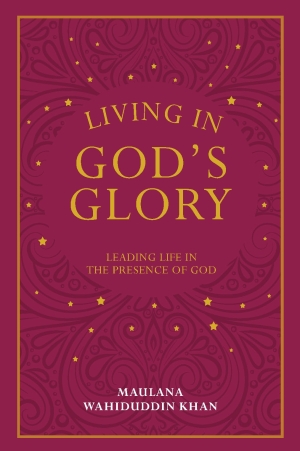Man finds himself in a world where there is a creation, but the Creator of this creation is apparently not in sight. There is design in this world, but apparently there is no visible designer. The entire universe functions like a great industry, but the engineer of this industry is nowhere to be seen. The prophets came to the world to answer these very questions. Prophets have told man that there exists an invisible, intangible being behind this visible, tangible creation; that this invisible being is God. The role of the prophets in one sense was to provide arguments to help people discover God.
The discovery of God takes place when one discovers one’s helplessness. Man discovers his total helplessness as compared to the all-powerfulness of Almighty God. In this way, he achieves the realisation of God. It has been aptly described in these words attributed to the fourth caliph Ali: “I discovered my Lord by the shattering of my ambitions.”
The discovery of God brings an intellectual and spiritual explosion. Such a discovery of God as revolutionizes one’s personality is called maarifah in the language of religion, while in secular language it may be termed spirituality. The Quran tells us that man was created so that he might worship God. In the words of the Quran, “I created the Jinn and mankind only so that they might worship Me.” (51:56). In this verse, the worship of God means the discovery and realisation of God. Such a discovery is, without doubt, the highest destination of anyone’s intellectual progress.
Featured Articles
Featured Videos
Sub Themes
FAQs
The God-oriented life begins with the discovery of God. When individuals, whether men or women, discover God, it means they have found the truth. And this truth pervades their whole being. This feeling of having discovered the truth becomes such a thrilling experience that it fills them with everlasting conviction, removing all frustrations from their lives. Therefore, losses are no longer such a problem; for, in spite of them, they never lose the feeling that their greatest asset, i.e. God, is still with them.
Man experiences this realization by pondering upon God's creations. The truth is that the universe is an expression of God’s attributes. In this respect, the universe is a complete introduction to God. God is visible in His creations, just as a human being sees his own reflection in the mirror, without having any doubts about it.
The vastness of space tells man that God, its Creator, is boundless. The observation of the sun and the stars shows us that God is all light. The heights of the mountains show us the greatness of God. The waves of the sea and the flow of the river tell us that God is a storehouse of boundless blessings. We see God’s bounties in the greenery of the trees. Man’s existence becomes a proof of God's existence. In the waft of air he experiences a divine touch. In the chirping of the birds, he hears God’s songs.
The God-oriented life for man starts by his remembering God. He begins to feel the presence of God. Everything serves to remind him of God. God's remembrance is never absent from his heart and mind. His mornings and evenings are spent as if he is living in God’s neighbourhood. Just as rain replenishes the crops, so does he remain ever immersed in the remembrance of God.
Source: Spirit of Islam June 2014
God is the Creator. When I see my existence, it is but natural for me to think how this existence came into being. The renowned French philosopher Rene Descartes said, ‘I think, therefore, I exist.’ Following this dictum, I would say, ‘I exist, therefore, God also exists.’ Because when there is a creation, a Creator is also bound to exist. Modern science tells us that our universe is vast, proportional, and continuously expanding. It is an intelligent universe, but a right approach would be to say that the universe is the work of an Intelligent Creator.
In order to better understand the idea of creation, let us also reflect on the development of human knowledge. Human knowledge has two different phases—the pre-Einstein period and the post-Einstein period. In the pre-Einstein period, knowledge was confined to the macro world, which was observable and measurable. It was believed that matter was eternal and had not been created. But, in the post-Einstein period, with the development of quantum physics and discovery of the phenomenon of the Big Bang, this thinking changed.
When the atom was split, the world of logic underwent a colossal change. Splitting of the atom revealed the micro world. It came to be known that subatomic particles, which constitute matter at the most fundamental level, cannot be observed even by the most powerful microscope. The question is when we cannot see then, how do we believe that they exist? They cannot be visually seen, but every scientist believes in their existence, for the reason that although we cannot see these things directly, we can measure their effects. We believe in the existence of all of these things, not by observation but by the effects they produce. In other words, the existence of these unobservable particles of the micro world can be proved by way inferential argument – they cannot be seen, but can be known by way of their effects. And if inferential argument is valid with regard to the unseen elements of the micro world, it is also valid with regard to the existence of God or the Creator.
Moreover, scientific studies of today tell us that about 13 billion years ago there occurred a big bang in space. After this, our universe came into existence. Scientists have found evidence to believe that in the beginning there was what they call a cosmic ball. All the particles now present in the universe were tightly bound to each other in this cosmic ball in a highly compressed and dense state. Then, according to astronomical studies, this cosmic ball suddenly exploded. The compact particles scattered outwardly and as they were moving away they started interacting and the present universe as we see it (galaxies, stars, etc.) came into existence. This was the beginning of matter, but the question was which external source caused the intervention so that the compact particles scattered outwardly?
Source: In Search of God
The answer to this question is in what the French philosopher Rene Descartes had said, ‘I think, therefore I am.’ To prove God’s existence, I extend this logic to say, ‘If I am, therefore, God is.’ This is because a human being is like a mini-god, one who possesses all divine qualities in a smaller magnitude. If a mini-god’s existence is possible, the Almighty God’s existence is possible too. The choice before us is not between ‘a universe with God’ and ‘a universe without God’, the real choice instead is between ‘a universe with God’ and ‘no universe at all’. The rationale is that when there is no option for you, the available option becomes the only choice.
Creation cannot be traced back endlessly. At some point, we will have to agree that there is someone who has brought creation into existence. If we do not accept this, the phenomenon of creation would be rendered endless and hence non-workable. Somewhere, we will have to put a full-stop, and agree that there is one all-powerful Creator.
Source: The Seeker’s Guide
Belief in the Oneness of God means to believe that all power lies in the hand of one God alone and that He alone deserves to be worshipped. It is God alone who fulfils all our needs. It is God alone who is behind the functioning of the entire universe. Superiority is the prerogative of the one and only God. No one enjoys real superiority in this world.
Belief in one God means we must express reverence for the true God, the Creator, a Being who truly deserves to be held in awe. We must accord the supreme status to the one and only God. We must ask Him alone to meet our needs. We must do obeisance before Him; we must trust Him implicitly, and above all others, we must reserve for Him the supreme status in all respects. Worship is the ultimate stage in any relationship: that is why, whatever its form, it must have God as its object.
When an individual makes God the object of his worship, he bows before an entity which really exists. God’s worshippers are graced with eternal blessings; the worshippers of things other than God can expect nothing but lasting deprivation.
Source: God’s Creation Plan



































